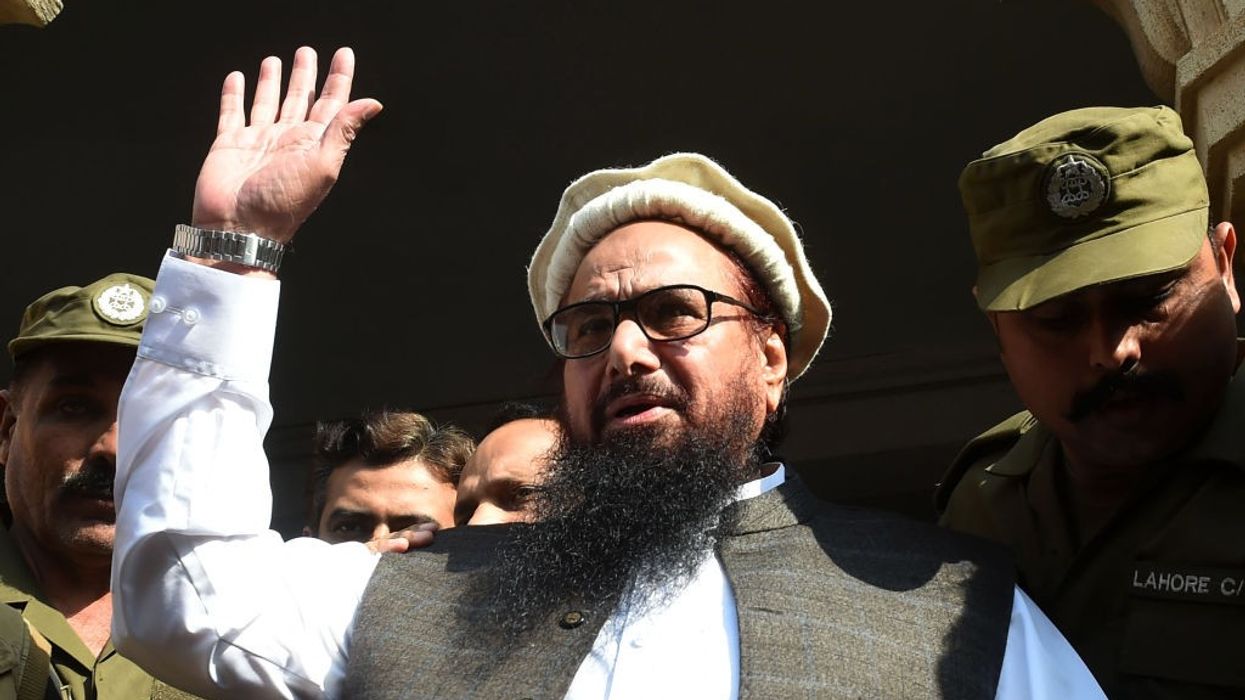A new political party named Pakistan Markazi Muslim League, believed to be a new face of the banned groups of the 2008 Mumbai terror attacks mastermind Hafiz Saeed, will participate in the February 8 general elections, according to a media report.
A BBC Urdu report said some of the candidates nominated by this organisation from different cities of Pakistan are those who are either relatives of Saeed or have been associated with the banned Lashkar-e-Taiba (LeT), Jamaat-ud-Dawa (JuD) or Milli Muslim League (MML) in the past.
Saeed, who has been incarcerated in a jail in Lahore, has been sentenced to a total of 31 years by Pakistan’s anti-terrorism courts in several cases of financing terrorism.
He was on December 10, 2008, included in the list of ‘global terrorists’ by the UN.
Pakistan also listed LeT, JuD and its affiliated parties and institutions, including Khair Naas International Trust, Falah Insaniyat Foundation, Al-Anfal Trust, Khamtab Khalq Institution, Al-Dawwat Al-Arshad, Al-Hamad Trust, Al-Madinah Foundation and Mu’az bin Jabal Educational Trust, in the list of banned organisations.
Quoting analysts, who monitor religious parties in Pakistan, the report on Feb. 4 claimed the Markazi Muslim League is the ‘new political face’ of Saeed’s JuD.
A spokesman of the party, however, denied any affiliation with Saeed’s organisations.
The report said Saeed’s son Hafiz Talha Saeed is participating in the elections from the Markazi Muslim League party and contesting from National Assembly Constituency NA-122 in Lahore — the same constituency from which Pakistan Muslim League-Nawaz leader and former federal minister Khawaja Saad Rafique is also contesting.
Similarly, Saeed’s son-in-law Hafiz Nek Gujjar is contesting the election from the Provincial Assembly constituency PP-162 on the ticket of the Markazi Muslim League.
In the past, a few people associated with Jamaat-ud-Dawa tried to participate in the elections in 2018 from the ‘Milli Muslim League’ party, but the Election Commission of Pakistan banned the organisation and rejected its application for registration after opposition from the then government.
After the application was rejected, the candidates of the party had to participate in the elections from an unknown party called ‘Allahu Akbar’ Tehreek which could not get any major success in the elections.
The name of ‘Milli Muslim League’ is not included in the list of banned parties in Pakistan, but in 2018, the US Treasury Department, with the approval of the State Department, declared this party banned and seven people associated with it were included in the list of “global terrorists”.
The persons who were declared “international terrorists” by the US included Saifullah Khalid, Muzamil Iqbal Hashmi, Muhammad Haris Dar, Tabish Qayyum, Fayyaz Ahmed, Faisal Nadeem and Muhammad Ehsan. They were accused of being part of the outlawed LeT.
Out of the seven members of the Milli Muslim League who were banned by the US, four of them are the nominees of the Makazi Muslim League for seats in the Punjab and Sindh assemblies.
Muhammad Fayyaz Ahmed and Faisal Nadeem Shaikh are contesting elections from Sindh Province on the provincial assembly seats PS-43 and PS-64, while Muhammad Haris Dar and Muzmal Iqbal Hashmi are contesting from the National Assembly constituencies NA-129 and NA-77 in Punjab Province.
Tabish Qayyum, included in the same list, is currently the main spokesman of the Markazi Muslim League, while Saifullah Khalid is also a part of the same party, but he does not hold any position.
Hanzala Imad, another spokesperson of the Markazi Muslim League, said, “None of our candidates is involved in any illegal activity and is not a part of any banned party.”
Concerning the US declaring some members of the Jamaat as terrorists in the past, he said, “No country has the right to declare people as terrorists without proof or legal procedures.”
Pakistan’s caretaker information minister Murtaza Solangi, in response to the BBC‘s question about the participation of people who were part of JuD in the past in parliamentary politics, said it was not the mandate of the caretaker government to make major policy decisions, especially regarding general elections.
He also said the Election Commission of Pakistan allowed registered parties to contest elections and the caretaker government had no role in allowing or preventing any party from contesting elections.
The BBC sent questions to the spokesperson of the Election Commission, but no response was received from him.
Nadeem Ahmad Awan, a candidate for a provincial assembly seat from Karachi, told the BBC that his party had no connection with Hafiz Saeed, but said that since 2003, he had supported many charities in Pakistan and had been a member of political organisations including Saeed’s JuD and Falah-i-Insaniya Foundation.
He told BBC that the “Pakistan Markazi Central Muslim League is participating in the general elections of Pakistan for the first time and we have also released our manifesto before the elections”.
In response to the questions sent by the BBC, Hanzala Imad, the Press Secretary of the Markazi Muslim League, said there was no truth in the allegations that the party was supported by Saeed.
“Pakistan Markazi Central Muslim League is led by Khalid Masood Sindhu and it is a party registered in the Election Commission of Pakistan, whose election symbol is the chair,” he said.
Imad also said that his party was not related to any banned party or person and he had fielded more than 500 people, including women and youth, who belonged to different schools of thought across the country.
BBC quoted journalist and analyst Majid Nizami, who has a close eye on religious and political parties in Pakistan, as saying that the Pakistan Markazi Muslim League is the ‘new political face’ of Hafiz Saeed’s JuD.
On November 26, 2008, ten Lashkar-e-Taiba terrorists from Pakistan arrived by sea route and in an indiscriminate fire killed 166 people, 18 of them security personnel, and injured several others during a 60-hour siege in Mumbai, India’s financial capital.
(PTI)





